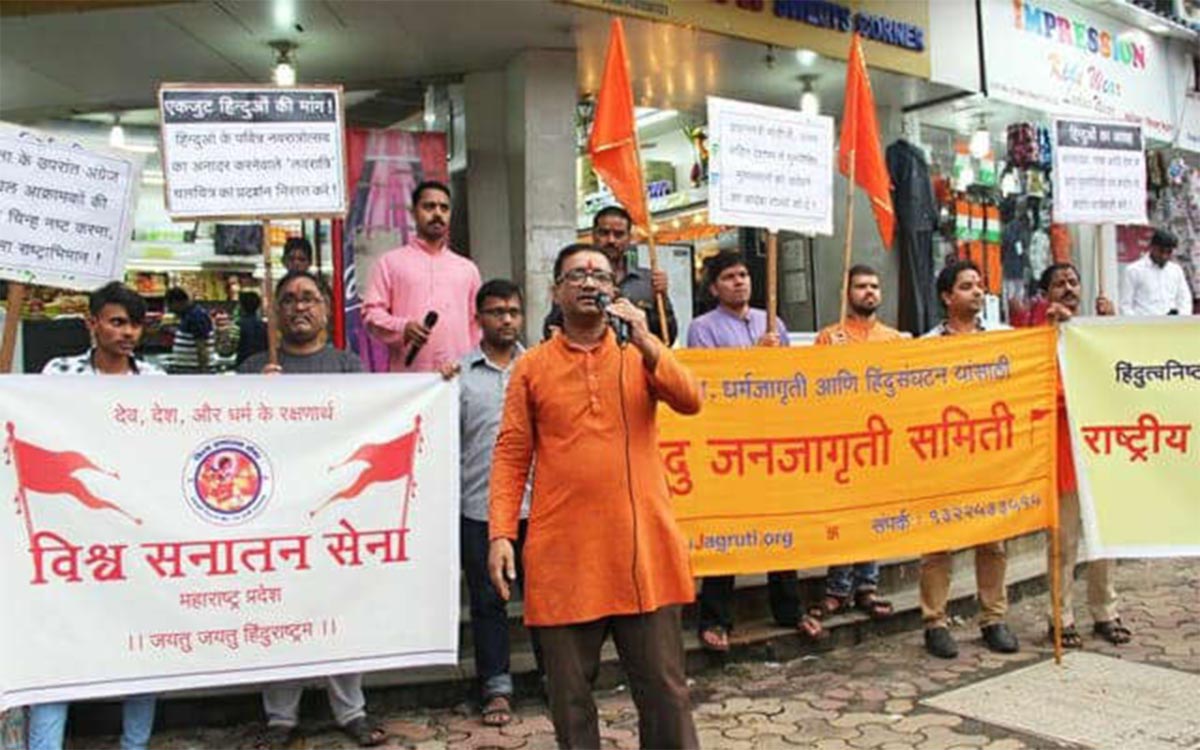Press Release:
Mahim police station senior PI S Shirsat informed CJP led delegation that permission to the HJS rally had been turned down. A Citizens’ delegation, led by CJP, meets with senior police officer to urge preventive action against scheduled Hindu Janajagruti Samiti morcha in Mumbai on August 10, 2024 at 6 pm
On Friday, August 9, a citizens’ delegation led by Citizens for Justice and Peace, Mumbai (CJP) met with Sudhakar Shirsath, Senior Police Inspector, Mahim Police Station to discuss and seek immediate preventive action against Hindu Janajagruti Samiti morcha in Mumbai on August 10, 2024 at 6 pm. The delegation, which comprised Teesta Setalvad (Secretary, CJP) and Dolphy D’Souza (President, The Bombay Catholic Sabha and Trustee, CJP), submitted a memorandum to urge the police official to deny the permission given to HJS for the rally as well as follow the preventive measures in case of hate speeches that have been issued by the Constitutional Courts time and again.
At the meeting, Senior PI, Mahim police station told the delegation that just a few hours back permission for the HJS rally had been turned down in the interests of preserving communal harmony.
The HateWatch campaign spearheaded by CJP minutely monitors such hate driven events and also files pre-emptive complaints against them.
Today’s memorandum submitted:
The memorandum that was submitted included the recent orders of the Hon’ble Supreme Court, the Bombay High Court as well as Orders issued by the Director General of Police Maharashtra on steps that need to be taken, especially pre-emotive ones, in situations involving delivery of hate speech by offenders.
The memorandum further highlighted the background of HJS, which have been conducted events and workshops that advocate for the passing of anti-Love Jihad laws in Maharashtra, create divisions along religious and caste lines by making Hindus “aware” of the consequences of autonomous and free choice marriages, raise calls for boycott of Halal and the economic boycott of Muslims in India, and given a communal colour to issues such as religious conversions and cow slaughter. As per the delegation, preventing such events and rallies to take place in the state of Maharashtra was crucial, especially in view of the impending state assembly elections, as there is an attempt to create an environment of oppression and otherisation of the Muslim community in the state.
The memorandum states “It is crucial to highlight here that HJS has been notorious for organizing such events and making controversial and derogatory statements amounting to hate speech against the Muslim minority community. This has grave potential of being blown up and leading to a law-and-order situation in the city, not just in the immediate future but collectively, as these events are held state-wide could have dangerous implications in the near future.”
It was further highlighted through the memorandum that even though the speakers at the present event are not clear, HJS has been providing a platform to many notorious hate offenders and hate speakers, such as BJP MLA T.Raja Singh, PramodMuthalik, Meenakshi Sharan, H.H. Sambhajirao Bhide, Kalicharan Maharaj and Suresh Chavhanke, who have taken this opportunity to create communal disharmony and public disorder.
As a part of the memorandum, the slew of directives that the Hon’ble Supreme Court has issued time and again for effective prevention of social disharmony, hate crimes and communal violence through the judgment of Mohd. Haroon and others v. Union of India [(2014) 5 SCC 252], Firoz Iqbal Khan vs Union of India [W.P (Civ.) No. 956 of 2020] and Tehseen Poonawalla v UOI and ors [(2018) 9 SCC 501] and Amish Devgan vs Union Of India [2021 1 SCC 1] were highlighted. Additionally, the multiple directions issued by the Supreme Court of India, through interim orders, in the case of Shaheen Abdullah vs Union of India [Writ Petition (Civil) No. 940 of 2022] was also emphasised upon. Notably, in the said case, the Apex Court had outlined the already codified statutory duties of a police officer to take action under section 151 of CrPC in case there is apprehension of hate speech. Video-tapping of events with apprehension of there being hate speeches was also directed.
Based upon the same, the citizens’ delegation urged the police officials to take action as per sections 130 (Police to prevent cognizable offences), 131 (Information of design to commit cognizable offences) and 132 (Arrest to prevent the commission of cognizable offences) of the BNSS and any other provisions of law as were necessary. They also highlighted that the if wider public is kept abreast of developments in this particular case, as well as in others, it would go a long way in re building faith and confidence in the rule of law in general and a police-citizen relationship in particular.
The delegation also handed over a ready to use Handbook, “Towards a Hate Free Nation” to the official as it succinctly provides latest jurisprudence from the Supreme Court of India (SC) and Bombay High Court (HC) that re-emphasise the role and responsibility to both prevent and prosecute targeted violence. This comprehensive booklet on preventive and other measures provides the measures that must be adopted by police and district administration in cases of such provocative events where inciting hate speeches are likely to be delivered. CJP believes that countering hate is a collective responsibility of both the concerned citizenry and the authorities.
